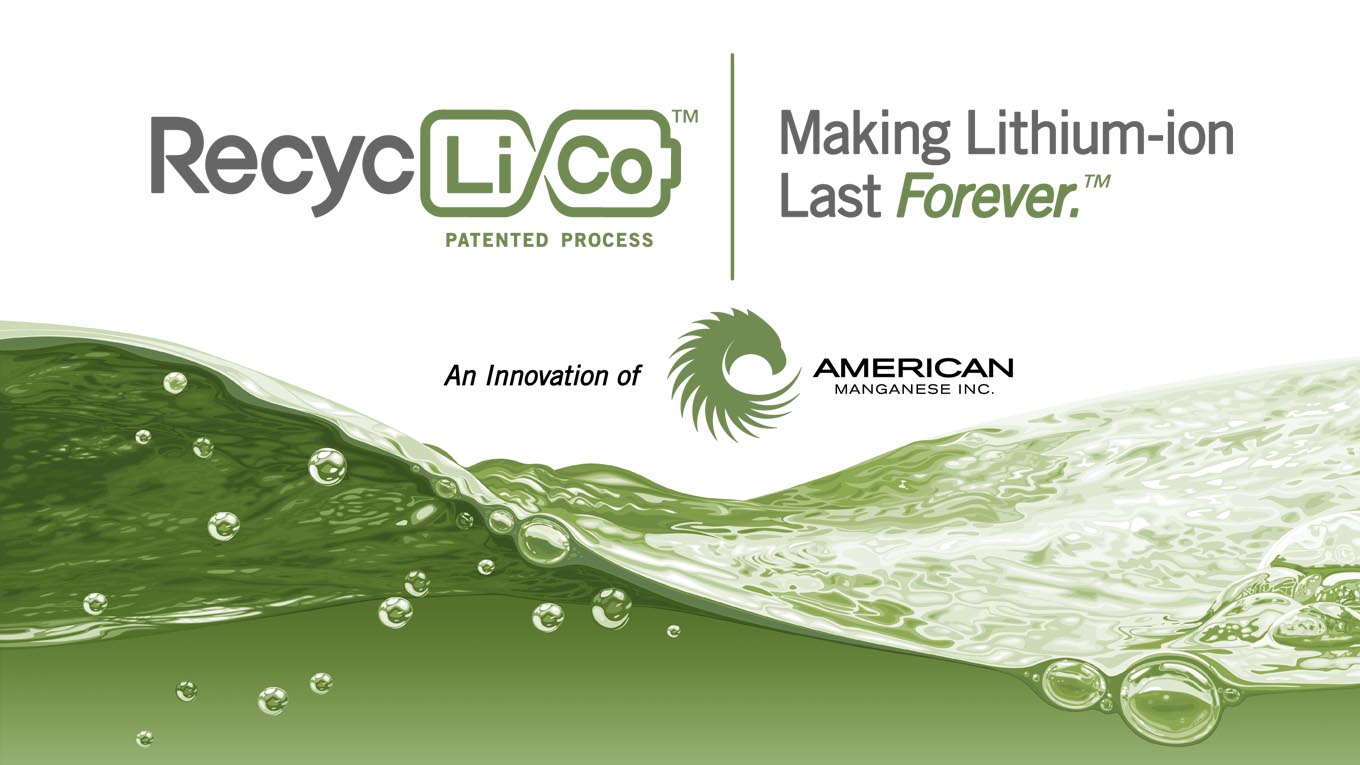
NIA has discovered a critical metal company with a patented process for the recovery of metals from lithium-ion batteries. The company aims to capitalize on its patented breakthrough technology and proprietary know-how to become a global industry leader in recycling spent electric vehicle lithium-ion batteries: American Manganese Inc (TSXV: AMY).
AMY's RecycLiCo™ Patented Process aims to promote a circular economy for the lithium-ion battery supply chain and set the standard for high recovery and purity of cathode materials from spent lithium-ion batteries. The process provides high extraction of cathode metals, such as lithium, cobalt, nickel, manganese, and aluminum at battery grade purity, with minimal processing steps. AMY's advanced recycling technology works with a variety of cathode chemistries including LCO, NCA, and NMC.
In April 2019, AMY was issued patent No. 10,246,343 for its lithium-ion battery cathode material recycling technology. In June 2019, AMY was issued patent No.10,308,523, AMY's second granted patent regarding the recycling of cathode materials into precursor cathode materials for new lithium-ion batteries.
AMY's patent portfolio enables the company to leverage near-term commercial opportunities by recycling pre-production scrap cathode material and disassembled end-of-life lithium-ion batteries from NCA (lithium nickel cobalt aluminum oxide), NMC (lithium nickel manganese cobalt oxide), and LCO (lithium cobalt oxide) chemistries. AMY's patent portfolio differs from other lithium-ion battery recyclers because it does not require any high heat smelting and produces a precursor cathode material for use in the manufacturing of new lithium-ion batteries.
Instead of relying on acquiring and developing mines in high risk jurisdictions to supply the growing demand for battery materials, AMY aims to have its patented urban mining technology provide a sustainable and geopolitically friendly supply of battery materials.
Cathode material accounts for more than 50% of a lithium-ion battery's material cost, which can be recovered near 100% by AMY's RecycLiCo™ Patented Process.
In recent weeks, AMY has been conducting recycling tests of lithium-ion battery material for two tier-one lithium-ion battery companies. With respect to AMY’s confidentiality agreement with the tier-one companies, they are being referred to as Company A and Company B. On November 20th, AMY reported the successful recovery of high purity (99.977%) nickel-cobalt hydroxide from the NCA cathode scrap material received from the tier-one lithium-ion battery company referenced as Company A. On November 13th, AMY reported the successful recovery of high purity (99.98%) nickel-cobalt hydroxide from the NCA cathode scrap material received from the tier-one lithium-ion battery company referenced as Company B.
The almost identical purity test results are an indication that the RecycLiCo™ patented processes can remain consistent and repeatable on cathode scrap material sourced from different companies. The next steps involve shipment of high purity recycled material back to the tier-one companies for analysis and confidential technical discussion regarding the recycling process.
AMY's objective is to collaborate efforts with the tier-one companies to seamlessly integrate recycled material into the re-manufacturing of battery cathodes. AMY believes the demand for recycling is immediate and lithium-ion battery manufacturers could benefit from integrating recycled cathode material in their manufacturing process because it would create use for their production scrap waste, reduce reliance for mined raw materials, and improve battery production costs.
According to the Benchmark Mineral Intelligence battery mega-factory tracker, there is a forecasted 400% increase in lithium-ion battery production capacity to 1 TWh by 2028 in order to meet the electric vehicle demand outlook. By 2040, Bloomberg New Energy Finance forecasts that 55% of all new car sales and 33% of the global fleet will be electric. Legacy automakers, like Volkswagen, have recognized the social, environmental, and economic value in an efficient and eco-friendly recycling process for their growing electric mobility fleet, with an aim to return raw materials back to the production process chain.
Past performance is not an indicator of future returns. NIA is not an investment advisor and does not provide investment advice. Always do your own research and make your own investment decisions. NIA has received compensation from AMY of USD$30,000 cash for a six-month marketing contract. This message is not a solicitation or recommendation to buy, sell, or hold securities. Never make investment decisions based on anything NIA says. This message is meant for informational and educational purposes only and does not provide investment advice.